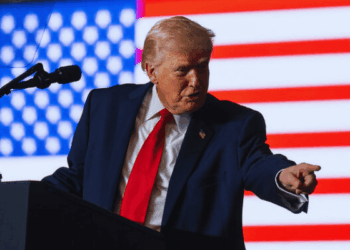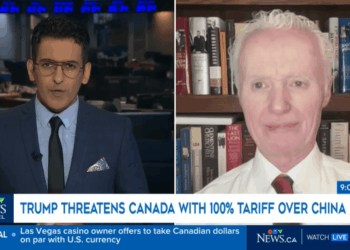This article originally appeared in WGI.World.
By Stephen Nagy, July 9, 2025
President Donald Trump’s tariffs and suggestions that Canada should relinquish its sovereignty and become the United States 51st state have left Canadians feeling hurt, insulted, aggrieved, wounded and betrayed.
These are all natural sentiments considering the longstanding and deep relationships both countries have enjoyed for most of their history. This depth is probably most typified by ordinary Canadians welcoming tens of thousands of Americans into their homes after the 9/11 Al Qaeda attack on the U.S.
Notwithstanding, the worrisome rising anti-American/anti-Trump sentiment, largely fueled by President Trump’s threats of tariffs, his tweets suggesting Canada be annexed as the 51st state, and a broader narrative of U.S. unreliability is not in Canadian interests, this is despite becoming a convenient political lightning-rod in Canadian domestic politics.
It could be argued that PM Mark Carney’s electoral win in the recent Federal election was largely not about the Liberal Party’s ten-year track record under former PM Justin Trudeau, but gaslighting President Trump as the reason for Canada’s socio-economic predicament that was made in Canada by Canadian politicians.
Yet this alienating rhetoric from our southern neighbor poses serious risks to Canadian national interests over the short, mid and long term. As Canada’s highest elected official, Prime Minister Carney’s most important priority must be to pull ordinary Canadians and business leaders away from reflexive anti-Trump and/ or anti-U.S. postures and to re-anchor Canada in a sober appreciation of the deep economic, security, and strategic interdependence that binds Canada and the United States.
No two countries in the world enjoy a more integrated economic relationship than Canada and the United States. This economic interdependence is a living embroidery in the North American market. To illustrate, in 2024, bilateral trade in goods and services reached approximately CAD 1.04 trillion—the largest such figure anywhere on the planet.
Roughly three-quarters of Canada’s exports flow south of the border, while U.S. investment accounts for over 50 percent of foreign direct investment in Canada. Our highways, railways, pipelines, electric grids, and digital networks form a contiguous North American production network that supports well over 2 million Canadian jobs in industries ranging from automotive manufacturing to high-tech services.
These are tough realities to dismiss when considering how consequential Canada-U.S. economic relations are for Canadian continued prosperity.
This is the conundrum for Canada, when Ottawa orients policy to antagonize its largest and most sophisticated market, the consequences are immediate and measurable. Using the examples of tariff retaliation, even a modest increase in U.S. steel or aluminum duties slams Canadian producers, dampens output in downstream sectors (from machinery to construction), and ripples through employment and provincial revenues.
The same is true with investment flight. For multinational companies that are sensitive to regulatory uncertainty or political friction, they may choose to recalibrate capital allocation toward more predictable jurisdictions. Another illustration comes from the example of currency volatility. As the Canadian dollar is closely correlated with U.S. policy, surprises can exacerbate domestic inflation or disrupt corporate financial planning.
It is precisely because Canadians instinctively recoil at these economic costs that a measured, collaborative relationship with Washington must remain our lodestar.
Economic ties are only one dimension of our interdependence. On matters of continental defense and collective security, Canada and the U.S. have operated under a joint command structure (NORAD) for over six decades, safeguarding North American airspace from foreign missile or aerial threats. These risks have not diminished but increased with North Korean ICBM missile development and Russia’s demonstrated willingness to use military force to achieve political objectives. Russia-China cooperation in the Arctic may bring further vulnerabilities in the Northern Front as well
When it comes to NATO, Canadian and American forces train together, coordinate intelligence sharing, and maintain interoperability in Europe, the Arctic, and beyond. Concrete examples include the co-development and co-deployment of critical air-defense systems (e.g., the F-35 Lightning II fighter), sharing real-time intelligence on cyber-threats, terrorism, and transnational organized crime, and conducting joint exercises to ensure rapid multinational response to crises.
Sustaining this security architecture demands consistent political goodwill, trust and deepening investment in the relationship not faux diversification to unreliable partners with a determination to change the current international order so that it favours their interests.
To illustrate, authoritarian regimes such as China’s will work hard to shape an ideological environment conducive to their rise and counter Western values, writes Yan Xue Tong of Tsinghua University. For example, the United States defines democracy and freedom from the perspective of electoral politics and personal expression, while China defines democracy and freedom from the perspective of social security and economic development. Washington should accept these differences of opinion instead of trying to impose its own views on others.
If Canada drifts into anti-Americanist postures, U.S. policymakers may grow reticent to pool sensitive capabilities or to treat Canada as a fully reliable partner weakening a deterrent posture that underwrites North American and allied security alike.
Within Canadian party politics, anti-Trump or anti-U.S. rhetoric has been embraced as a differentiator to mobilize liberal and progressive voters. Opposition leaders who denounce “American-style” policies or promise to chart an independent course gain quick traction among constituencies frustrated by global populism.
Make no mistake, this is a perilous shortcut to rejuvenate Canada or any country that has suffered from ten or more years of poor governance.
First, politicians must differentiate between electoral and national interests. While winning elections is important, domestic policy popularity does not translate into strategic advantage. A veneer of principled independence may play well in campaign ads, but it may also erode our negotiating leverage with Washington.
Second, every country needs policy permanence based on national interest, not stakeholder interests. While governments may change, the structure of our international milieu endures and must inform how we identify and prioritize national interests. Rhetoric that alienates Canada’s closest ally risks leaving a negative legacy that outlasts any single administration.
Third and critically, politicians must be literate about the economic backlash that can come from overly anti-American/ anti-Trump public sentiment. The moment Canadian businesses perceive a hostile U.S. climate, they may lobby Ottawa for concessions that have the effect of undermining government efforts to diversify markets or boost domestic innovation.
However a Herculean task, Prime Minister Carney must lead by example. In speeches, diplomacy, and private consultations, he should consistently underscore that a strong U.S.–Canada partnership is not a betrayal of Canadian sovereignty but its very guarantor. Carney must do his utmost to distinguish his government from the previous Trudeau government that had a track record of publicly insulting and denigrating MAGA voters, President Trump and the U.S.
Canada’s political culture proudly embraces causes such as diversity, equity, inclusion, decolonization of curricula, and critiques of “Western‐dominated” world orders. These themes resonate deeply with many Canadians and rightly so, insofar as they advance justice and social cohesion. Yet an exclusive focus on these issues at the expense of core bilateral relations carries risks and Canadian leaders must avoid the lure and danger of a further progressive tilt in Canada.
The reasons are primarily threefold: 1) to avoid an even greater perceived ideological drift; 2) to prevent Canada from being classified as a security risk; and 3) to avoid pressure for re-alignment.
In terms of the negative ramification of a perceived ideological drift, U.S. policymakers and the American public may interpret Canada’s intensifying emphasis on post-Western paradigms or decolonization as a signal that Canada is no longer the reliable, “neighbor we grew up with.” The narrative shifts from “trusted partner” to “unpredictable ally” complicates everything from 5G security approvals to intelligence-sharing arrangements.
On the security side, as Canada deepens trade and technology ties with states that Washington views as strategic competitors which is most notably China, Canada’s position in the Five Eyes intelligence alliance and NORAD may come under renewed scrutiny. In the extreme case, security clearances on critical procurement or collaborative R&D projects could be downgraded or revoked.
Yes, security matters for the U.S. Canada is seen by adversaries of the U.S. as a useful asset in thwarting the U.S. in its competition with China, Russia, and Iran, and they will continue to attempt to shape Canadian domestic politics in a direction that frustrates the U.S. and that includes hypercharging anti-American/ anti-Trump narratives to create wedges between the Canada and the U.S.
If Canada appears to pursue an alternative bloc with China, Europe, or the so-called Global South under the banner of “multipolarity” Washington could respond by reinforcing foot-dragging on cross-border defense initiatives, visa easements, or regulatory equivalences that Canadian exporters rely upon.
Carney’s challenge is to strike an authentically progressive domestic agenda without tethering it to a foreign policy posture that antagonizes our principal strategic ally.
It is prudent for any middle power to diversify export markets. China, with its 1.4 billion consumers, represents an appealing alternative to a U.S. market that has occasionally flexed its tariff muscle. Indeed, two-way trade between Canada and China stood near 89.1 billion in 2023 according to the University of Alberta’s China Institute.
This diversification carries strategic hedges including balancing cooperation with autocracy and democracies, concerns by Five Eyes members and possible diplomatic retaliation.
When diversifying towards China, Beijing’s state-led economic model is often accompanied by strategic mercantilism, industrial subsidies, intellectual property pressures, and in some cases, coercive diplomacy. Overdependence exposes Canadian firms to abrupt policy shifts. It also exposes Canada to other forms of oppression including hostage diplomacy, executions, and foreign interference to mention a few.
Our closest allies in the Five Eyes also have concerns about key high-tech sectors including 5G, quantum computing, and AI. These all fall squarely within the Five Eyes remit. Deepening Chinese partnerships in these areas could trigger reevaluation of Canada’s access to shared intelligence or collaborative research.
Diplomatic Retaliation also remains a risk. Beijing has shown a willingness to punish perceived adversaries through informal trade restrictions (e.g., on canola, pork, seafood). A Canada that looks too comfortable in Beijing’s orbit risks becoming a bargaining chip in Sino-U.S. tensions.
Prime Minister Carney should therefore pursue measured and highly considered diversification focusing on non-strategic sectors where market access can be secured without compromising security obligations. At the same time, the government must emphasize to Canadian businesses the long-term value of their U.S. integration and building partnerships with the E.U., Japan, South Korea, India, ASEAN, Australia and New Zealand as priority partners.
To recalibrate public opinion and corporate strategy, a multi-pronged approach should include but not be exclusive to better strategic communications campaigns, increasing economic incentives, more nuanced defense and security messaging, smart and balanced trade diversification, and an inclusive domestic agenda.
Part of any strategic communications campaign will be the launching of a “Canada–U.S.: Built Together” initiative, featuring joint success stories in manufacturing, clean energy, and research. This can be deployed through social media, town halls, and business-leader forums to illustrate how U.S. ties underpin Canadian middle-class prosperity.
This will necessarily include a clear articulation of how Canada is helping themselves not at the expense of the U.S. but in synergy, that is enhancing Canadian prosperity contributes directly to the MAGA agenda.
This can be done through economic incentives such as fast-tracking regulatory harmonization with the U.S. in sectors such as biotech, digital services, and electric vehicles, making it easier for Canadian companies to innovate and export.
Ottawa should also offer “North American Resilience” grants to firms that deepen cross-border supply-chain collaboration, signaling government support for integrated production.
On the security and defense front, publicly reaffirm Canada’s commitment to NORAD modernization and NATO burden-sharing, underscoring that defense cooperation yields both security and economic dividends. This should be done hand-in-hand with increased parliamentary briefings on the costs of diminished intelligence-sharing, making the stakes clear to elected officials across the aisle.
Balanced trade diversification should use existing and potential markets. For example, pursuing new trade agreements in the Indo–Pacific (e.g., CPTPP expansion) and Africa, but attach strict guidelines ensuring that Canada does not trade away critical technologies or compromise Five Eyes protocols.
Ottawa can also establish an interagency “China Risk Assessment Unit” to advise Canadian firms on geopolitical vulnerabilities, helping them make informed decisions rather than reactive pivots. New Zealand’s Assessing Country Risk Guideline for reporting entities supervised by the Department of Internal Affairs, March 2024 may be a model to emulate with Canadian considerations.
Lastly and in line with Canada’s more liberal society Ottawa needs an inclusive domestic agenda. This means continuing advancing diversity, equity, and inclusion at home in a non-dogmatic and sensible process and framing these values as complementary to, not in competition with, Canada-U.S. ties.
The packaging of this approach may position Canada as a bridge between North America and emerging markets, leveraging our social model and rule-of-law tradition to attract investment while preserving alliance solidarity.
Leaders in Ottawa and particularly Prime Minister Carney stand at a pivotal moment. Across Canada’s social media feeds and editorial pages, anti-American/ anti-Trump rhetoric has proven a powerful tool for political mobilization. This mobilization is a double-edged sword that risks unleashing unintended economic and security costs. By re-anchoring Canadian public sentiment around the bedrock realities of U.S. interdependence which is trade, defense, and shared democratic values, Carney can secure Canada’s prosperity for generations to come.
This is not a plea for uncritical alignment but for calculated engagement: leveraging our most important bilateral relationship to underwrite national resilience, diversify wisely, and safeguard Canada’s role as a constructive middle power in the world. Only by pulling Canadians and businesses away from the siren song of anti-Americanism can we ensure that Canada’s foreign policy remains pragmatic, purposeful, and firmly in the national interest.
Dr. Stephen R. Nagy is Professor of Politics and International Studies at the International Christian University, Tokyo and concurrently a Visiting fellow for the Hungarian Institute for International Affairs (HIIA,) a visiting fellow at the Japan Institute of International Affairs (JIIA,) and senior fellow at the Macdonald-Laurier Institute (MLI.)








